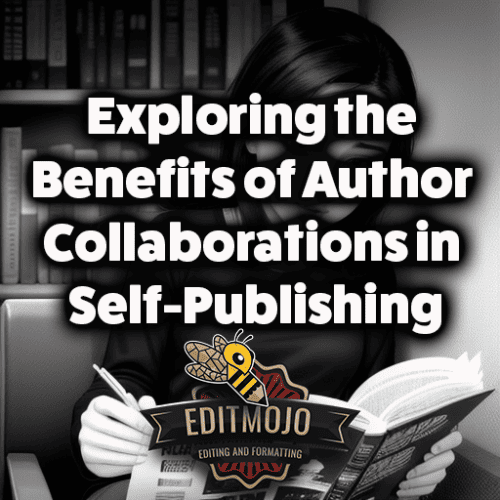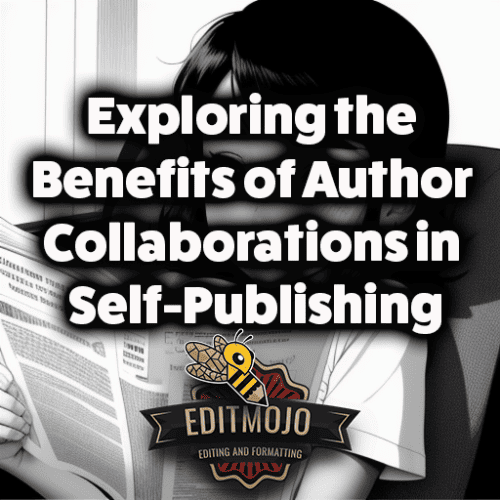Benefits of author collaborations in self-publishing
Benefits of author collaborations in self-publishing. Writing, they say, can be a lonely pursuit. It’s often envisioned as a solitary endeavor, where authors retreat into their personal spaces to churn out the words that will eventually become their next great novel. However, the landscape of writing is evolving, with author collaborations and self-publishing becoming increasingly popular.
Author collaborations involve two or more authors joining forces to write a book or a series, while self-publishing allows writers to publish their works independently, bypassing traditional publishing houses. These two trends combined have revolutionized the publishing industry. This article aims to explore the benefits and the intricacies of author collaborations in self-publishing, from sharing workload and costs to expanding creative horizons.
Key Takeaways
| Topic | Key Points |
|---|---|
| The Concept of Author Collaborations | Author collaborations involve two or more authors working together to write a book or a series. Types include co-writing, anthologies, and shared universes. |
| Benefits of Author Collaborations | Benefits include pooling of strengths, shared workload, increased learning, accountability, and creativity. |
| Financial and Marketing Benefits | Authors can share self-publishing costs, gain an expanded readership, engage in shared marketing efforts, and produce books at a faster rate. |
| Navigating Collaboration Challenges | It’s important to set clear agreements, manage differences, and maintain a healthy working relationship. |
| Finding a Collaboration Partner | Authors should identify and vet potential collaborators carefully, considering compatibility, professionalism, and shared interests. |
| Tools and Resources | Tools like Trello, Asana, Google Docs, and Slack can facilitate author collaborations. |
| Future of Author Collaborations | Author collaborations in self-publishing are likely to grow, fueled by technological advancements and a rising trend in self-publishing. |
I. The Dynamics of Author Collaborations in Self-Publishing
Understanding the Concept
Author collaboration is a team effort where authors pool their creative juices to weave compelling narratives. It can take many forms, including co-writing, where authors jointly craft a story, or anthologies, where authors contribute individual stories or chapters.
A stellar example of co-writing is James S.A. Corey, a pseudonym for the writing team of Daniel Abraham and Ty Franck, who together penned the popular Expanse series. In shared universes, authors develop individual stories within a common world. Wild Cards, a series edited by George R. R. Martin, boasts 30+ authors contributing to a shared universe over many books.

Types of Author Collaborations
While each collaboration differs based on the authors involved, the common thread is the unique blend of shared creativity and responsibility that challenges the traditional solitary writing process. The types can range from the organic sharing of ideas and mutual writing, to a more structured division of labor where authors take on different aspects of the book.
II. The Advantages of Author Collaborations
Pooling of Strengths
Author collaborations are an exceptional way to marry different strengths and skills. An author with a knack for riveting dialogues can join forces with another who excels at intricate plot development. The result? A book that leverages the best of both worlds. By complementing each other’s weaknesses, the authors deliver a more rounded and engaging story.
Sharing the Workload
Writing a book can be a daunting task. When authors collaborate, they divide the responsibilities, making the journey more manageable. One may focus on research, another on character development, and another on world-building. This divide-and-conquer approach allows for a faster and more efficient writing process.
Opportunity for Learning
Author collaborations provide a platform for learning from each other. Each author brings a different set of skills, knowledge, and experiences, fostering an environment where one can learn and grow. This mutual sharing and learning can significantly improve an author’s craft.

Increased Accountability
Working with a partner often provides an added layer of accountability. It’s easier to procrastinate or slack off when you’re working alone. But when you’re part of a team, there’s an inherent drive to meet your commitments. This can lead to increased productivity and motivation.
III. Financial and Marketing Benefits
Splitting Costs
Self-publishing incurs costs such as editing, cover design, and marketing. By collaborating, authors can share these costs, making the process more affordable. A collaborative approach also allows for pooling resources to invest in professional services, ensuring a high-quality finished product.
Expanded Reach
Each author comes with their unique reader base. Collaborating means each author’s book is exposed to the other’s readership, potentially leading to a larger audience and greater book sales.
Shared Marketing Efforts
Collaborative marketing can amplify the book’s reach. Joint book tours, shared social media promotions, or cross-promotion among personal networks can significantly boost visibility.
Faster Output
Two heads are often better than one, and in this case, faster too. With shared workload and responsibilities, the output rate can be significantly higher. More books equate to more chances of revenue, which is always a plus in the self-publishing world.
IV. Creative Benefits
Enhanced Creativity
Author collaborations bring together varied perspectives and imaginations, often resulting in richer and more diverse storytelling. The resulting novel can be more nuanced, intriguing, and unique than a work by a single author.
Constructive Criticism
Being open to feedback and critique is a crucial aspect of any creative process. Collaborations offer an opportunity for continual feedback, providing fresh insights and suggestions that can improve the work significantly.
V. Navigating the Challenges of Collaborations
Collaborations aren’t always smooth sailing. However, careful planning, mutual respect, and clear communication can steer the ship through any storm.

Setting Clear Agreements
To avoid misunderstandings, it’s vital to have a contract that spells out rights, responsibilities, profit-sharing, and conflict resolution. It’s also important to clarify roles to ensure everyone knows what is expected of them.
Managing Differences
Every author has their writing style, creative process, and work habits. Embracing these differences and finding a harmonious way to work together is key to a successful collaboration.
VI. How to Find the Right Collaboration Partner
Identifying Potential Collaborators
Look for authors who share your genre interest, work ethic, and have a compatible personality. Online writing communities, writer’s groups, and workshops can be great places to find potential collaborators.
Vetting Potential Collaborators
Before diving into a project, take time to get to know your potential partner. Discuss your expectations, working style, and creative vision to ensure a good fit.
VII. Tools and Resources for Author Collaborations
There are several tools and platforms that can facilitate author collaborations. Project management tools like Trello or Asana, collaborative writing tools like Google Docs, and communication tools like Slack can enhance the collaborative experience.
VIII. The Future of Author Collaborations in Self-Publishing
With the rise of self-publishing and collaborative platforms, author collaborations are poised to grow. As technology advances, it’s not hard to envision a future where real-time collaborative writing becomes even more accessible and widespread.
Conclusion (Benefits of author collaborations in self-publishing)
Author collaborations in self-publishing offer numerous benefits that can make the journey of writing a book more enjoyable, less stressful, and potentially more successful. So why not consider shaking up the solitary pursuit of writing and embark on a collaborative adventure?
Your potential bestseller may just be a collaboration away!
Call to Action (Benefits of author collaborations in self-publishing)
If you have experiences with author collaborations, we’d love to hear your story. Share your experiences, insights, or questions in the comments. And don’t forget to share this article with any aspiring authors who might find it helpful!
References and Further Reading
Top Five Questions and Answers
| Question | Answer |
|---|---|
| What is an author collaboration? | Author collaboration is when two or more authors join forces to write a book or a series. It can take many forms, such as co-writing, anthologies, and shared universes. |
| What are the benefits of author collaborations? | Benefits include pooling of strengths and skills, shared workload, opportunity for learning, increased accountability, financial savings, expanded reach, shared marketing efforts, and enhanced creativity. |
| What challenges can arise from author collaborations and how can they be navigated? | Challenges can include differences in writing style, creative vision, and work habits. These can be navigated by setting clear agreements, managing differences constructively, and maintaining open and respectful communication. |
| How can authors find collaboration partners? | Authors can find collaboration partners through online writing communities, writer’s groups, and workshops. They should identify and vet potential collaborators carefully for compatibility, reliability, and shared interests. |
| What tools and resources can facilitate author collaborations? | Tools like Trello, Asana, Google Docs, and Slack can enhance author collaborations by providing platforms for shared writing projects, project management, and communication. |
